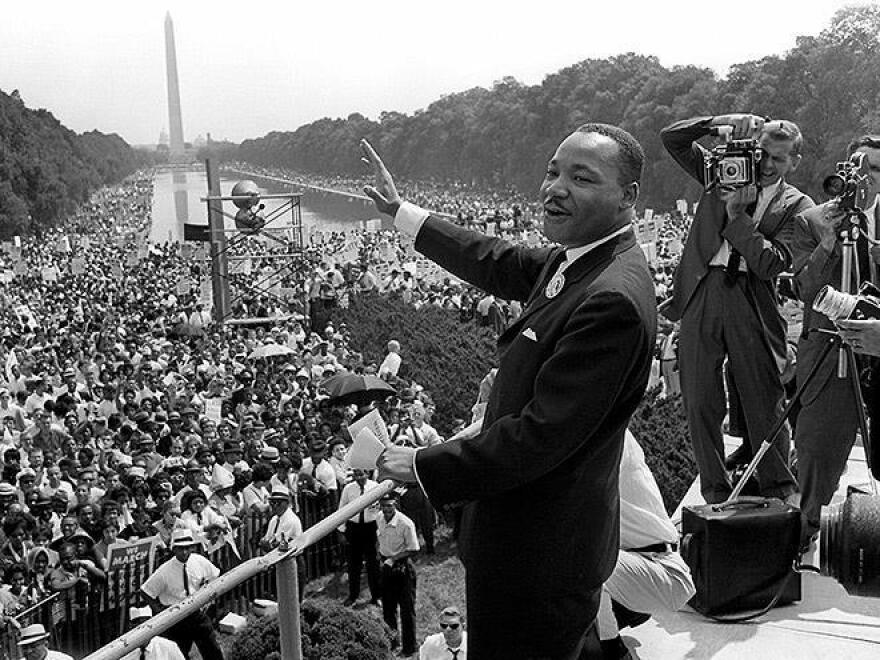It was unclear nearly three years ago what would happen to a cache of civil rights-era items with a Charleston provenance.
The collection included the original tape of a Martin Luther King Jr. speech delivered July 30, 1967, at Charleston County Hall, as well as a recording surreptitiously made of a Ku Klux Klan rally the night before King's appearance.
It also contained audio of Ralph Abernathy's lengthy speech of April 1, 1969, delivered during the Charleston Hospital Workers Strike.
Abernathy had become president of the Southern Christian Leadership Conference after King's assassination in April 1968, and he was in town along with other civil rights leaders to support nurses and other workers protesting unequal pay and mistreatment.
The audio recordings have not been heard except by a few and are sure to attract the attention of civil rights scholars, students and others. The year 1967 was pivotal in the life of King, who was shifting his attention from integration and enfranchisement to systemic problems of mass poverty, American imperialism and Black self-determination.
The collection went to auction in 2019 and sold in New York City for $55,000 plus a 25-percent buyer's premium.
Now it's back in Charleston, part of the holdings of the College of Charleston's Avery Research Center thanks to a donation from the Merrill C. Berman Collection. Avery staff plan to mount an exhibition in 2023 contextualizing and interpreting the materials for public consumption.
The items had belonged to Columbia-based journalist Eugene Sloan who covered the events and made the recordings when he worked for The State newspaper. His daughters, Laura and Mary, tried to sell the collection intact a few years ago. The International African American Museum declined the offer since at the time it wasn't a collecting institution and did not have the means to store and preserve the materials, a curator had said.
Bureaucracy got in the way when the Avery and the Center for Civil Rights History and Research at the University of South Carolina expressed interest in procuring the collection.
At the time, Laura Crosby, a Summerville resident, and her sister Mary Roby were disappointed that the boxful of civil rights history wasn't purchased by someone in Charleston, Crosby told The Post and Courier.
Their father thought highly of King and appreciated the efforts of civil rights activists, she said. Sloan died of a heart attack in 1969. The items remained in storage for decades.
Avery Director Tamara Butler said the collection will help her team update a narrative that has long portrayed Charleston as a relatively mild-mannered place that saw far less confrontation and violence than cities such as Birmingham or Montgomery in Alabama.
There's a reason King came to Charleston in 1967, she said. The groundwork had been laid by local activists over many years since the city was not an afterthought of the freedom movement but one of its essential hubs.
That's why Butler wants to use the new gift and the history it represents as a tool to find related testimonies of racial resistance and rebellion.
"The larger hope for us is that it will actually open up a gateway for us to collect stories," she said.
Perhaps some in Charleston can share their memories of that period — where they were and what they were doing on the night of King's speech, or when Abernathy was in town, Butler said.
"The bigger goal is to get more voices in conversation with these (of King and Abernathy)," she said.
Besides the tapes, which include remarks from Johns Island activist Esau Jenkins and his granddaughter Jackie Gimball, the collection contains photographs of King and his entourage, the equipment Sloan used to make the audio recordings, photographs of the Klan rally and Sloan's Hasselblad medium-format camera.
On one of the tapes, listeners can hear KKK Grand Dragon Robert Scoggin at a meeting in Ravenel calling for King's assassination, followed by sounds of approval from those gathered that night.
King, instead, condemned violence in his half-hour speech. Responding to urban riots, he told his audience that setting fire to property within their communities was counterproductive. Better, he said, to "build, baby build."
Aaisha Haykal, Avery's manager of archival services, said the audio eventually will be made available online, perhaps along with digital images of some of the other items.
A grant received a few years ago from the National Historical Publications and Records Commission is helping to fund digitization efforts. Another grant received this year from the Donnelley Foundation will help pay for an oral history project that's likely to overlap with the effort to create an exhibit that places King's address at its center.
Daron Calhoun, Avery's outreach and public programming coordinator, and coordinator of the race and social justice initiative, said securing the collection took some convincing. The staff insisted the materials needed to be housed in Charleston, and that Avery could contextualize them in ways that engaged the larger community.
Calhoun formed a curatorial committee of nine to help identify, prioritize and organize exhibition projects, he said. The group includes museum and nonprofit professionals, city officials, community members and student and faculty representatives.
The King project has shot to the top of the project list, though it could take a year or more to put it together, Calhoun said.
"It's going to take up the entire building," he said.


